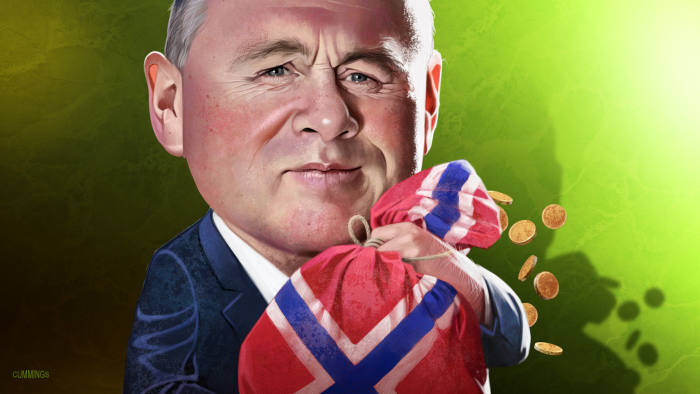
Nicolai Tangen, next chief of Norway’s sovereign wealth fund
The hedge fund manager has unleashed a scandal-laced storm of Nordic ‘Janteloven’
by Richard MilneNicolai Tangen says the past few weeks have been “like being in the middle of a tumble-dryer”. One of London’s most successful hedge fund managers, the 53-year-old seemed like the perfect person to run the world’s largest sovereign wealth fund when he was announced as the next chief executive of Norway’s $1tn oil fund in March.
But since then, his appointment has unleashed the biggest storm around the fund in its 24-year history. Everything from an opulent private gathering to potential conflicts of interest and the placing of some of his funds in tax havens has faced intense scrutiny.
Mr Tangen and Oystein Olsen, the governor of Norway’s central bank, which houses the manager of the fund, signed a contract this week to regulate any potential conflicts of interest, only to face a hostile press conference and scepticism from opposition politicians.
Underlying it all is a simple question: is Norway ready to allow a rich hedge fund manager to take over in September its national rainy day fund? The biggest petroleum producing country in western Europe is facing the twin economic crises of Covid-19 and the drop in oil prices. Norway will take a record amount of money from the fund this year, forcing it to sell assets for the first time.
A supporter of Mr Tangen says the furore around him is a classic case of Janteloven, the Scandinavian social code whose first rule states “you’re not to think you’re anything special”. Another backer blames “people with no experience talking about things they don’t understand. They just go with the headlines. Norway is too small a country for such a large fund.”
The controversy started with revelations about an all-expenses-paid seminar Mr Tangen organised last November in the US. He flew in friends, ministers and investors from Norway, the UK and elsewhere to attend a three-day event, with a concert by Sting and all-day debates. They featured everyone from a former Olympic sailor and Norwegian military officer to hedge fund manager Paul Marshall, artist Olafur Eliasson, and included former FT columnist Lucy Kellaway and the FT’s Gillian Tett, who moderated a panel.
Piquantly, the current head of the oil fund, Yngve Slyngstad, also attended, accepting a flight home on a private jet with about 30 other Norwegians paid for by Mr Tangen — Mr Slyngstad later accepted he had “really screwed up”.
Mr Tangen knows that in his new job he will have to change his lifestyle. He has expressed regret that the seminar — which he spent several years planning — was quite so extravagant.
But focus then moved to Mr Tangen’s hedge fund AKO Capital, an $18bn fund that he started in 2005. Under his contract with the central bank, Mr Tangen will cut his ownership of AKO from 78 per cent to 43 per cent and donate all dividends during his five-year tenure — estimated at £1bn — to his charitable foundation. One leftwing opposition politician called Mr Tangen a “walking conflict of interest”.
It is a long way from Mr Tangen’s beginnings in the southern coastal city of Kristiansand. He made money as a teenager collecting plastic bottles from football matches for the recycling deposits. As a 16-year-old, he started work at the local bank and dreamt of investing in the stock market.
He then joined the elite course in Norway’s military for his national service, learning Russian and interrogation techniques over 18 intense months. Stints at Cazenove and hedge fund Egerton Capital followed before he set up AKO, whose main fund has delivered returns three times better than the market since its launch in October 2005.
Mr Tangen says AKO combines an investment philosophy focused on long-term holdings in quality companies such as LVMH and Ferrari, with a systematic approach. AKO has teams dedicated to forensic accounting, behavioural analysis, and market research, as well as more traditional equity research.
Mr Tangen likes to challenge his fund managers; they must record reasons for every investment decision, to be reviewed later on. He brings in outsiders such as Arctic explorer Erling Kagge to talk to them. Mr Kagge describes Mr Tangen as “curious, generous, hard-working, with a great sense of humour”.
Norway’s oil fund is one of the most important investors in the world, owning the equivalent of 1.4 per cent of every listed company, on average. But it is run closer to a passive index fund, with holdings in about 9,000 companies, than as an active investor. Some question if Mr Tangen is the right fit. He himself has given little away about how he wants to run the fund, apart from suggesting that “fine-tuning” its strict mandate could deliver excess returns.
Money is not his motivation. His roughly NKr7m ($720,000) annual salary will be dwarfed by the up to NKr70m in wealth tax he estimates he will have to pay each year after moving his family — he is married with three children — to Oslo from London. Instead, he talks about running his life Soviet-style, with five-year plans, and that now is the time for public service.
Mr Tangen insisted this week he has not thought for “one second” about backing out. But debate around his appointment is not yet over: the politicians who oversee Norway’s central bank will give their opinion next month.
For now, Mr Tangen says: “This job is about standing like a rock when it’s stormy around you, whether it be the media or volatility in capital markets. In the future, it’s about trying to be a rock in the storm, on behalf of the Norwegian people.”